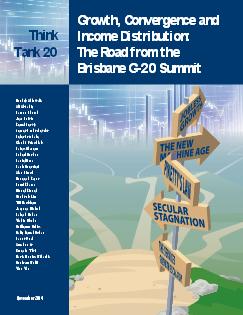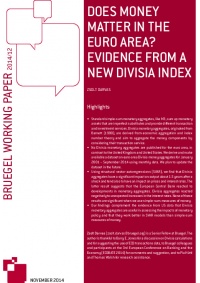Durden, T. (2014) “The Eurozone’s QE Problem“, ΘZeroHedge, 19 Νοεμβρίου. Over the last couple of weeks, as the Federal Reserve ended their latest round of quantitative easing, there have been many calls that the pickup of the “QE Baton” by the BOJ and ECB. The problem is that the impact of liquidity interventions in Japan and the Eurozone do not carry the same “punch” as was witnessed in the …Read More
Quantitative Easing and Deflation in a Creditor Economy
Daniel Gros: “Quantitative Easing and Deflation in a Creditor Economy, στο Growth, Convergence and Income Distribution: The Road from the Brisbane G-20 Summit, σσ. 87-91, Think Tank 20: Νοέμβριος 2014. On November 15-16th, world leaders gathered in Brisbane, Australia for the ninth G-20 summit, aimed at increasing world GDP and charting a pathway to sustainable, inclusive growth and resilience through both short and medium-term actions. Experts from think tanks …Read More
Growth, inequality, and social welfare: Cross-country evidence
Dollar, D., Kleineberg, T. & Kraay, A. (2014) “Growth, inequality, and social welfare: Cross-country evidence“, VoxEU Organisation, 19 Νοεμβρίου. Concerns about inequality are at the forefront of many policy debates. While inequality has increased in many countries over the past few decades, in others it has decreased. This column uses data from 117 countries over the past four decades to investigate the importance of such changes in inequality, as …Read More
Europe’s Bonds Are Unyielding
Gilbert, M. (2014) “Europe’s Bonds Are Unyielding“, Bloomberg View–European Economy, 14 Νοεμβρίου. With central bank interest rates at or near zero in many parts of the world, borrowing costs for governments and companies have plunged to record lows. In Europe, corporate bond yields are now so low that it’s hard to see how fixed-income investors will be able to make money. It’s also difficult to imagine that yet more cheap …Read More
Recent slowdown in global trade: Cyclical or structural
Boz, Ε., Bussière, Μ. & Marsilli, C. (2014) “Recent slowdown in global trade: Cyclical or structural“, VoxEU Organisation, 12 Νοεμβρίου. The past three years have witnessed a slowdown in global trade. This column shows that the slowdown was particularly pronounced in advanced economies, especially the Eurozone. In a panel of 18 OECD economies, most of the slowdown can be explained by cyclical factors. However, structural factors – global …Read More
Contagion in the European sovereign debt crisis
Glover, B. & Richards-Shubik, S. (2014) “Contagion in the European sovereign debt crisis“, VoxEU Organisation, 12 Νοεμβρίου. Understanding the probability and magnitude of financial contagion is essential for policymaking. This column applies a framework for modelling financial contagion to data on the cross-holding and credit risk of sovereign debt in Europe. Credit markets perceived little risk of contagion from these spillovers following a sovereign default. It is important for …Read More
What caused the great recession in the Eurozone? What could have avoided it?
Martin, P. & Philippon, T. (2014) “What caused the great recession in the Eurozone? What could have avoided it?“, VoxEU Organisation, 11 Νοεμβρίου. Economists disagree over the origin of the Eurozone Crisis. This column uses a quantitative framework to sort through the various channels and policy impacts. It argues that fiscal and macroprudential policies are complements, not substitutes. Prudent fiscal policy is helpful but cannot by itself undo private …Read More
Does Money Matter in the Euro area? Evidence from a new Divisia Index
Darvas, Ζ. (2014) “Does Money Matter in the Euro area? Evidence from a new Divisia Index“, Bruegel Working Paper 2014/12, 06 Νοεμβρίου. The purpose of this paper is to examine the possible role of money shocks on output and prices in the euro area. Since no Divisia monetary aggregates are available for the euro area, we first create and make available a database on euro-area Divisia monetary aggregates. We …Read More
Any hope that a revival of Spain’s housing market could help kick-start the country’s economy is likely to prove misplaced
Montalvo, J.G. (2014) “Any hope that a revival of Spain’s housing market could help kick-start the country’s economy is likely to prove misplaced“, LSE EUROPP, 06 Νοεμβρίου. Recent months have seen house prices in Spain rise for the first time in six years, after the housing sector was badly hit by the financial crisis. José García writes that one of the most damaging aspects of the crisis in Spain …Read More
The effect of immigration on public finances
Preston, Ι. (2014) “The effect of immigration on public finances“, VoxEU Organisation, 05 Νοεμβρίου. Data on social attitudes show that the perceived burden of immigration on a nation’s public finances is one of the strongest economic concerns associated with hostility to immigration. Yet recent official reports suggest an important positive role for immigration in the long-run health of public finances. This column argues that there can be no general …Read More






